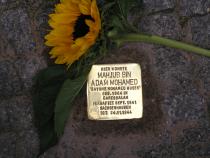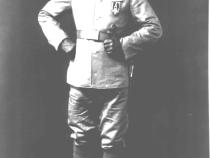Mahjub bin Adam Mohamed (also known as Bayume Mohamed Husen) was born in 1904, the son of a Sudanese soldier serving in the German colonial army in German East Africa. When World War I broke out, Mahjub joined his father’s company as a child soldier. After the war, he worked for German companies in Tanganyika, now a British Mandate, before signing up to work as a waiter on a Woermann Line steamship. In 1929 he left his work aboard ship to stay in Germany.
Mahjub settled in Berlin and married a German woman from the Sudetenland. In Germany, he became known as “Bayume Mohamed Hussein” or simply “Husen”. In order to improve his and his family’s prospects in Nazi Germany, he became involved in the neo-colonial movement. He pointed out his services to the German Reich whenever he had to deal with the authorities. Twice he applied for a decoration for serving on the frontline, setting a precedent for the German authorities. Between 1934 and 1941 he had small parts, some of them speaking, in 23 films. His most prominent role was that of a signalling apprentice in the film “The Riders of German East Africa”, a position he is thought to have actually held during his time in the colonial army. He had postcards made of himself in his film uniform, bearing the motto “Souvenir of a German Askari from G. E. Africa”. His last major role was that of a loyal servant in the film “Carl Peters” with Hans Albers. From 1931 he also taught Swahili at the Friedrich Wilhelm University and, for five years, worked as a waiter in “Haus Vaterland” on Potsdamer Platz.
Apparently not intimidated by the danger he faced as an African in Nazi Germany, Mahjub remained active after 1933 and claimed the right to fight injustice. In 1935, following his denunciation by a fellow waiter, he took his former employer at “Haus Vaterland” – Kempinski – to court for unfair dismissal.
Like his father twenty-five years earlier, Mahjub tried to volunteer for the army when World War II broke out, but without success. Eventually, he came into conflict with his employers at the university. But it was his affairs with German women, producing several illegitimate children, which the Nazis objected to most. The Nazi regime responded ruthlessly to what they deemed a “transgression of racial barriers”. As there were no legal grounds for charges of “racial defilement”, Mahjub was sent to Sachsenhausen concentration camp without trial, where he died three years later.
Mahjub (Bayume Mohamed) bin Adam Mohamed (Husen)
Location
Brunnenstr. 193
District
Mitte
Stone was laid
September 2007
Born
22 February 1904 in Daressalam (Deutsch-Ostafrika / Tansania)
Occupation
Soldat, Schauspieler
Verhaftet
in
Berlin
Verhaftet
September 1941 to November 1944
in
Sachsenhausen
Dead
24 November 1944 im KZ Sachsenhausen




